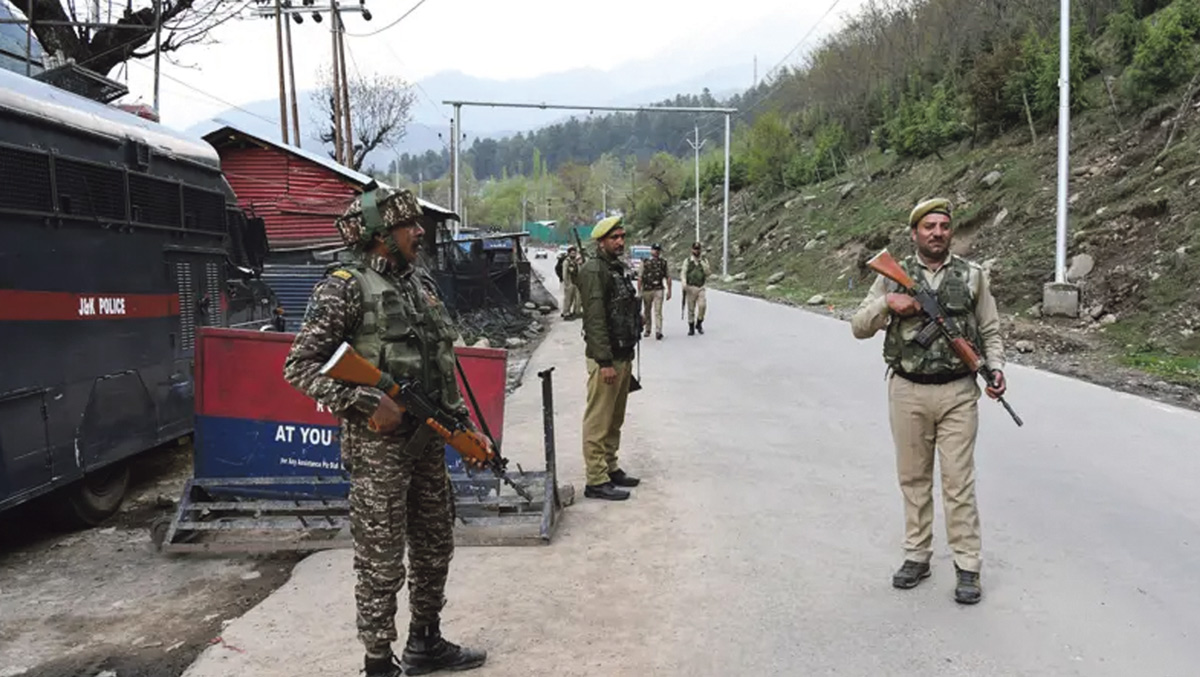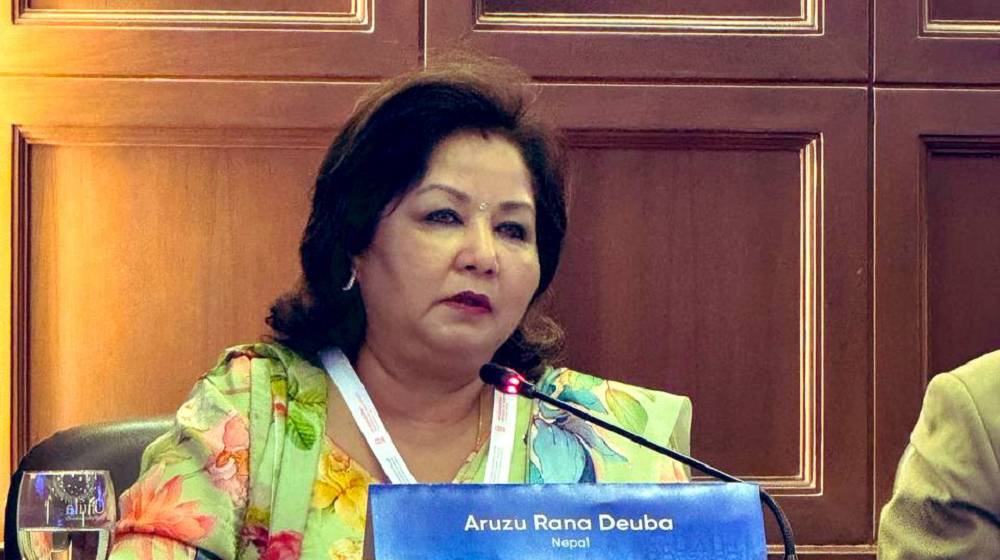Nepse plunges by 32. 44 points on Wednesday
The Nepal Stock Exchange (NEPSE) plunged by 32. 44 points to close at 2,655.88 points on Wednesday.
Similarly, the sensitive index dropped by 5. 41 points to close at 446. 48 points.
A total of 18,477,703-unit shares of 308 companies were traded for Rs 7. 57 billion.
Meanwhile, Nepal Micro Insurance Company Limited (NMIC) and Crest Micro Life Insurance Limited (CREST) were the top gainers today with their price surging by 9. 99 percent. Likewise, Corporate Development Bank Limited (CORBL) was the top loser with its price dropped by 10. 00 percent.
At the end of the day, the total market capitalization stood at Rs 4. 41 trillion.
It is Parliament’s responsibility to endorse School Education Bill with priority: Speaker Ghimire
Speaker Devraj Ghimire has said that it is the Parliament's responsibility to pass the School Education Bill with priority.
In a meeting held to discuss contemporary political issues with the Chief Whips of various political parties today, Speaker Ghimire said that the School Education Bill should be passed on priority with the operation of the Parliament at a time when the teachers of the community schools are agitating demanding the promulgation of the Education Act.
Speaker Ghimire said, "The Parliament has been under pressure to discuss the budget as per the government's policies and programs, economic procedures and provisions of the Fiscal Responsibility Act."
Stating that it is also the responsibility of the Parliament to pass the School Education Bill with priority, he said, "The agitating teachers have said that they will not return to school without the enactment of the School Education Bill and in a meeting with me they have also asked me to take the initiative to that end.”
On the occasion, Speaker Ghimire proposed running the Parliament on all days except on Saturdays and public holidays because of the burgeoning workload related to the pre-budget discussions, the government's policies and programs, budget and the School Education Bill as well.
The meeting approved the proposal. Accordingly, the schedule will be presented in the Parliament's Business Advisory Committee meeting scheduled to be held on April 25.
"The Parliament starts the process for approving of the bill immediately after the Sub-committee submits its report. The Civil Service Bill is also about to be passed from the committee. Keeping in view the policy and programs, and the technical limitations of the budget, we should be ready to pass the bills, including education and civil service bills, in this session," Speaker Ghimire said.
Renowned Brazilian footballer Roberto Carlos calls on PM Oli
Brazilian football legend Roberto Carlos called on Prime Minister KP Sharma Oli at the Office of the Prime Minister and Council of Ministers in Singha Durbar on Wednesday.
Renowned football player Carlos is currently in Nepal to attend the ongoing Nepal Super League (NSL) third season football championship underway at Dashrath Stadium as a special guest.
On the occasion, PM Oli welcomed the football star Carlos and said that his visit to Nepal inspired the players and youths here.
Stating that Nepal and Brazil enjoyed a cordial diplomatic relation, the PM stressed on exchange of learning in the sports sector between the two countries. The Prime Minister urged the Brazilian former player to visit Nepal again with an itinerary of enjoying mountain flight and jungle safari.
In response, Carlos expressed gratitude for the hospitality accorded to him in Nepal and said he was pleased to meet with Nepal's Prime Minister, youths and athletes.
Widely regarded as one of the greatest left-backs in football history, Carlos made his senior debut for Brazil in 1992. He earned over 120 caps for the national team and was instrumental in Brazil’s 2002 FIFA World Cup victory in South Korea and Japan.
Carlos spent most of his club career at Real Madrid, where he played from 1996 to 2007. During his time with the Spanish giants, he won four La Liga titles and three UEFA Champions League trophies.
Nearly 8,000 units of EVs imported till third quarter
Nepal imported 7,967 units of electric cars, jeeps and vans worth Rs 18.62bn over the first nine months of fiscal year 2024/25. This surge, generating Rs 11.47bn in government revenue, underscores EVs’ rising popularity in the country, driven by favorable policies, environmental goals and economic incentives.
Foreign trade data for the first nine months of 2024/25, unveiled recently by the Department of Customs (DoC) shows, over 50 percent of imports, or 4,414 units, fell in the 51-100 kW motor capacity range which is ideal for Nepal’s urban and semi-rural roads. Smaller EVs (up to 50 kW) accounted for 2,783 units, while 742 units were in the 101-200 kW capacity range. Likewise, 17 units were in 201-300 kW motor capacity range and tow had capacity in excess of 300 kW.
China dominated Nepal’s EV market, supplying 74.08 percent of total imports of the country in the review period. EVs worth of Rs 14.49bn were imported form the northern neighbor in the review period, with brands like BYD and Dongfeng leading due to competitive pricing and advanced features. India follows with 2,023 units, or a market share of 25.39 percent, bolstered by Tata’s strong presence, as seen with models like the Punch EV. Imports from Germany (31 units), the US (5 units), South Korea (3 units) and Indonesia (3 units) were minimal, underscoring the China-India duopoly in the Nepali EV market.
In 2023/24, Nepal imported a total of 11,701 electric vehicles (EVs) - a growth of a whopping 188.91 percent compared to 2022/23 when 4,050 units of electric cars, jeeps, and vans entered the country. More than a third of total EV imports in 2023/24 came from China. A total of 8,938 EVs units came from China and remaining 2,763 from other countries. The total import value of these EVs was Rs 29.48bn.
The EV boom in Nepal aligns with Nepal’s Nationally Determined Contributions (NDC) which targets to increase the share of EVs in private passenger vehicles to 25 percent by 2025 and 90 percent by 2030. Lower import duties, which are 15-80 percent for EVs and over 240 percent for those powered by fossil fuel, and the availability of affordable cars loaded with advanced technologies have fueled demand for EV in Nepal.
The growing EV adoption is gradually reducing reliance on costly oil imports. Data shows Nepal saved Rs 11.07bn in 2023/24 due to a decline in the import of petroleum products.
Japan's factory activity shrinks on tariff woes, services perk up, PMI shows
Japan's manufacturing sector fell for the ninth consecutive month in April, with the au Jibun Bank flash PMI climbing to 48.5 from 48.4 in March.
According to Reuters, new orders decreased substantially, and company confidence dropped to its lowest level since June 2020 due to US tariff concerns.
Meanwhile, the services sector recovered modestly, with the PMI rising to 52.2 from 50.0, boosted by better demand and the largest increase in sales in three months.
Reuters reported that the composite PMI, which combines both sectors, bounced back to growth at 51.1, up from 48.9 in March.
As input costs increased at the quickest rate in two years, businesses raised their selling prices. Japan's economy is nonetheless hampered by persistent inflation and unclear trade policy.
Sudip Neupane of Butwal dies in terrorist attack in Pahalgam
The identity of a Nepali man who was killed in a terrorist attack in Pahalgam, Kashmir has been ascertained.
It has been confirmed that Sudip Neupane of Butwal lost his life in the terrorist attack that took place in Pahalgam, South Kashmir on Tuesday.
Butwal Sub-Metropolitan City-14 ward Chairman Dadhiram Neupane confirmed that 27-year-old Neupane died in the attack.
According to ward Chairman Neupane, Sudip had gone to visit Kashmir with his family on Saturday.
Preparations are underway to bring the lifeless body of Neupane to Nepal, he informed. Other members of the family are safe.
Twenty-seven persons including a Nepali national died and several others were injured in the terrorist attack that occured at 3 pm yesterday. Those killed in the terrorist attack in Pahalgam were mostly tourists.
The Lashkar-e-Taiba group has claimed responsibility for the attack.
It has been learnt that two locals were also killed in the incident.
After receiving the information about the attack, Prime Minister Narendra Modi, who is on a two-day official visit to Saudi Arabia, is returning to India.
Zelensky raises alarm over Chinese role in Russian drone production
Ukrainian President Zelensky has claimed Chinese nationals are working at a Russian drone facility and suggested Moscow may have obtained Chinese drone technology without Beijing’s knowledge, according to Al Jazeera.
This follows his prior assertion that China is supplying Russia with weapons and gunpowder, which Beijing rejects. Ukraine's foreign ministry summoned the Chinese ambassador to express alarm over China's potential involvement in the fighting, Al Jazeera reported.
Zelensky also claimed that Russia is recruiting Chinese nationals to fight, with Kyiv investigating possible links to Chinese authorities.
China and Russia declared a "no limits" partnership shortly prior to the 2022 invasion of Ukraine.
Foreign Minister Rana condemns terrorist attack in Pahalgam
Foreign Minister Arzu Rana Deuba said that the Nepal government was deeply shocked and saddened by the heinous terrorist attack that took place in Pahalgam, Kashmir.
Taking to the social networking site X, the Foreign Minister strongly condemned this act of terrorism and the senseless violence that has claimed innocent lives.
"Our thoughts and prayers are with the victims and their families during this difficult time, and we wish a swift and full recovery of those injured in the incident", she said.
Nepal stands in steadfast solidarity with the Government and people of India in this time of sorrow, the minister noted.
"We are currently verifying reports regarding the possible loss of any Nepali nationals in this tragic incident. Further updates will be provided as more information becomes available", Minister Rana said.














